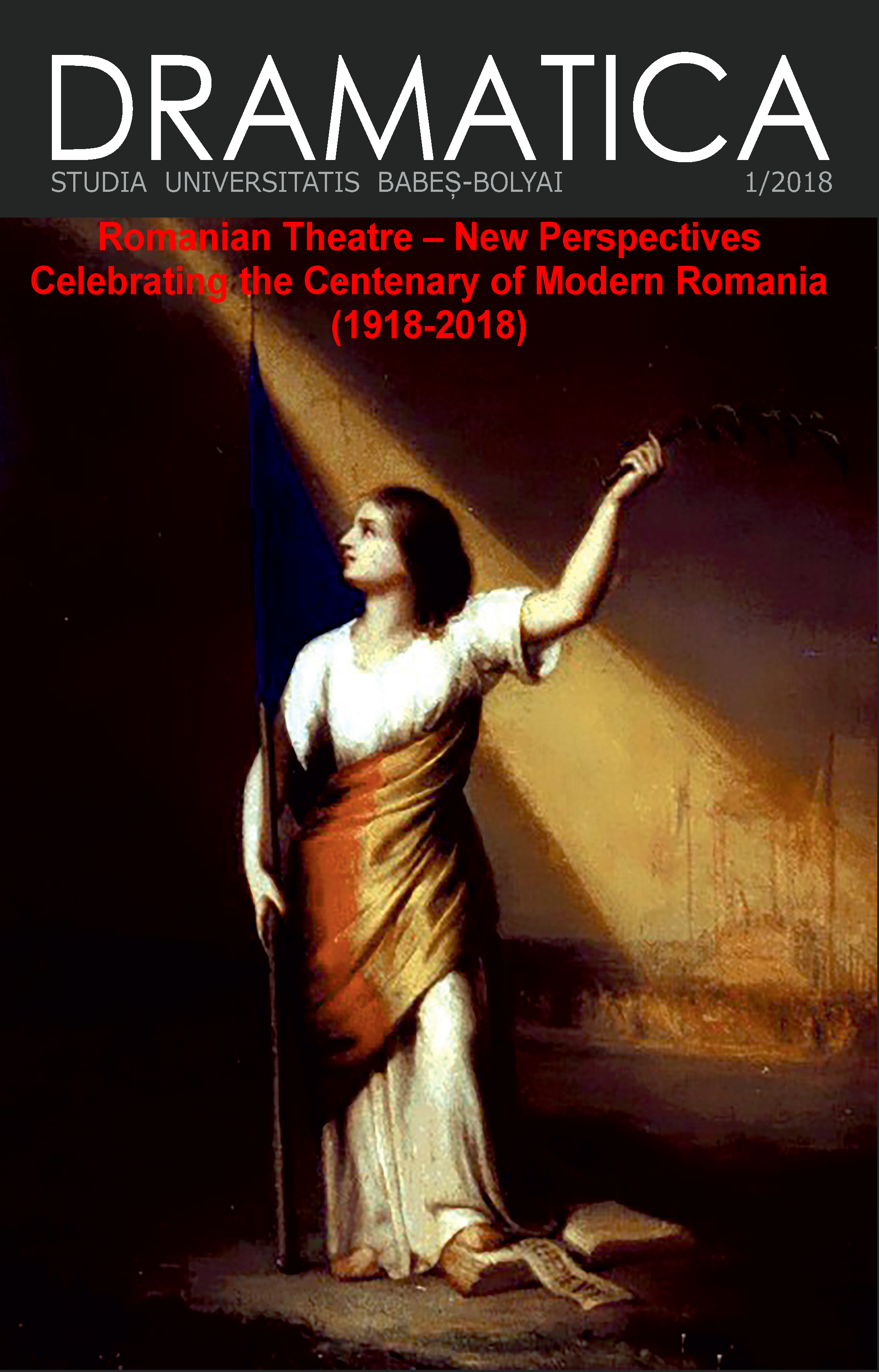The Theatrical Christening of Romania
DOI:
https://doi.org/10.24193/subbdrama.2018.1.03Keywords:
Romania, theatre, 19th century, Caragiali, allegory, nation, MarianneAbstract
The present paper focuses on the first theatrical representation of Romania by the actor and playwright Costache Caragiali (1815-1877), examining the portrayal of the female protagonist of the prologue written by the said author on the occasion of the grand opening of Teatrul cel Mare (the future National Theatre) from Bucharest, in 1852. The paper also traces the history of the allegorical representation of the nation in the Romanian theatre from the beginning to the end of World War I, by such authors like Gheorghe Asachi (one of Caragiali’s precursors), actor Mihail Pascaly, Frédéric Damé (a writer and journalist of French origin), Ion Luca Caragiale (Costache Caragiali’s nephew and one of Romania’s greatest writers of all times) and actor and playwright Zaharia Bârsan.References
*** “Cronica străină” [“The Foreign Review”]. In Gazeta Transilvaniei, no. 5, February 2, 1860.
*** Dicționarul literaturii române de la origini până la 1900 [Dictionary of Romanian Literature from Its Origins to 1900]. Bucharest: Editura Academiei R.S.R., 1979.
*** Vestitorul românesc, XVII, no. 103, Wednesday, December 31, 1852.
ASACHI, Gheorghe. “Prolog compus de A. G. Asaki, și rostit pe Teatrul Varietăților din Ieși în 23 februarie 1837. La acea întâi dramatică Reprezentație Moldovenească a Conservatorului Filarmonic. [Prologue composed by A.G. Asaki and spoken on the Iasi Variety Theatre’s stage on February 23, 1837. During the first Moldavian Performance of the Philharmonic Conservatory].” Albina românească (supliment), no. 18, March 4, 1837, 83-84.
BÂRSAN, Zaharia. Furtuna. Cu toții una. Poemul Unirei [The Storm. All Are One. The Union Poem]. Sibiu: Printing Office W. Krafft, 1921.
BURADA, Teodor T. Burada. Istoria teatrului în Moldova [History of Theatre in Moldavia]. Iasi: Institutul de Arte Grafice N. V. Ștefaniu & Comp., 1915.
CARAGEALI, C. Teatru Naționale în Țeara Românească. Dedicată publicului român (București, iulie 1855) [National Theatre in Wallachia. Dedicated to the Romanian Audience (Bucharest, July 1955)]. Bucharest: Printing Office C.A. Rosetti, 1867.
CARAGIALE, I.L. 100 de ani. Revistă istorică națională a secolului XIX, în 10 ilustrațiuni [100 years. National Historical Revue of the 19th Century, in 10 Illustrations]. In Opere. Teatru. Scrieri despre teatru. Versuri [Works. Theatre. Writings on Theatre. Verses]. Volume III, second edition, revised and expanded by Stancu Ilin, Nicolae Bârna, Constantin Hârlav, preface by Eugen Simion. Bucharest: Editura Fundației Naționale pentru Știință și Artă, 2015.
CARAGIALI, Costachi. „Prolog pentru inaugurarea noului teatru din București” [“Prologue for the Inauguration of the New Bucharest Theatre”]. In Familia, XVII, no. 14, Sunday, February 15/27, 1881, 81-84.
DAMÉ, Frédéric. “Visul Dochiei. Poemă dramatică” [“Dochia’s Dream. Dramatic Poem”], translation by D.Ollănescu and T. Șerbănescu. In Familia, III, no. 10, February 28, 1879, 150-152; no. 11, March 15, 1879, 161-162; no. 12, March 31, 1879, 183-184.
DJUVARA, Neagu. O scurtă istorie a românilor povestită celor tineri [A Brief History of the Romanians for the Young]. 12th edition, revised and expanded. Bucharest: Editura Humanitas, 2010.
FILITTI, Georgeta Filitti. “Teatrul cel Mare”. In Ziarul Metropolis, March 9, 2016. Accessed on February 15, 2018: https://www.ziarulmetropolis.ro/teatrul-cel-mare/
GAVRIL-ANTONESEI, Gabriela. “Ipostaze feminine în cultura română a secolului al XIX-lea: «Marianne»-le românești” [“Feminine Aspects in the Romanian Culture of the 19th Century: the Romanian ‘Mariannes’”]. In Études sur le texte dédiées à Halina Grzmil-Tylutki. Edited by Joanna Górnikiewicz, Barbara Marczuk, Iwona Piechnik. Kraków: Jagiellonian Library, 2016, 306-314.
LANDES, Joan B. Visualizing the Nation. Gender, Representation and Revolution in Eighteenth-Century France. New-York, London: Cornell University Press, 2001.
OLLĂNESCU, Dimitrie C. Teatrul la români [Romanian Theatre]. Edition managed, preface, notes, and comments by Cristina Dumitrescu. Bucharest: Editura Eminescu, 1981.
MASSOFF, Ioan. Actorul de la miezul nopții. Oameni și întâmplări din lumea teatrului de altădată [The Midnight Actor. People and Events of Olden Theatre]. Bucharest: Editura Cartea Românească, 1974.
MASSOFF, Ioan. Istoria Teatrului Național din București, 1877-1937 [The History of the Bucharest National Theatre, 1877-1937]. Bucharest: Editura Librăriei „Universala” Alcalay & Co, 1937.
MASSOFF, Ioan. Teatrul românesc. Privire istorică [Romanian Theatre. A Historical Perspective]. Volume I. Bucharest: Editura Pentru Literatură, 1961.
MASSOFF, Ioan. Teatrul românesc. Privire istorică (1860-1880) [The Romanian Theatre. A Historical Perspective]. Volume II. Bucharest: Editura Pentru Literatură, 1966.
MĂRCUȘ, Ștefan. Thalia română. Contribuții la istoricul teatrului românesc din Ardeal, Banat și părțile ungurene [Romanian Thalia. Contributions to the History of Romanian Theatre in Transylvania, Banat and the Hungarian Parts]. Timișoara: Institutul de Arte Grafice “G. Matheiu”, 1945.
POP, Ioan-Aurel. Istoria şi semnificaţia numelor de român/valah şi România/Valahia [History and Significance of the Names of Romanian/Wallachian and Romania/Wallachia]. Reception speech at the Romanian Academy, May 29, 2013. Accessed February 18, 2018: http://www.acad.ro/com2013/pag_com13_0529.htm
RĂDULESCU, Mihai Sorin. “Despre numele României” [“About the Name of Romania”]. In România literară, XLI, no. 41, October 16, 2013.
XENOPOL, A.D. Domnia lui Cuza-Vodă [Cuza Voda’s Rule]. Volume I. Iasi: Publishing Printing Office “Dacia” P. Iliescu & D. Grossu, 1903.
Downloads
Published
How to Cite
Issue
Section
License
Copyright (c) 2018 Studia Universitatis Babeș-Bolyai Dramatica

This work is licensed under a Creative Commons Attribution-NonCommercial-NoDerivatives 4.0 International License.


